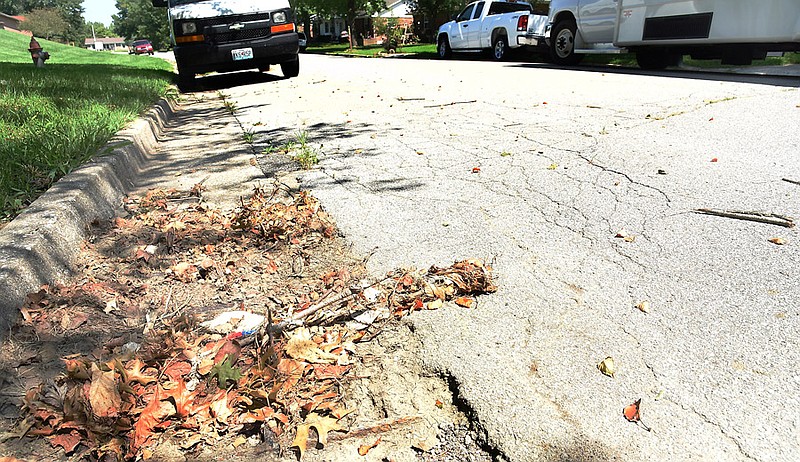The Jefferson City Council will vote at its next meeting whether to approve adding workers who would focus on improving and maintaining the city's stormwater infrastructure.
Last month, the city's Public Works and Planning Committee approved using a $750,000 supplemental appropriation - passed by the City Council in August - to hire three additional Public Works crew members who would work on neighborhood stormwater projects, like fixing cross-road pipes and improving inlets. The crew members would cost about $250,000.
The remaining $500,000 would be combined with the $360,000 from the capital improvement sales tax stormwater funds for an engineering design contract and three design/bid/build projects, which still need contractors.
Public Works Director Matt Morasch presented two recommendations, with hiring additional staff as his preferred recommendation. The other recommendation was to use the entire $750,000 allotment toward an engineering design contract and four design/bid/build projects, which included addressing issues on Chickadee Road and from Schellridge Road to Huntleigh Place.
Morasch said the first option would be cheaper in the long run, because engineering and administration costs would be almost eliminated because several projects would be fixed in-house. The department would also use its own equipment instead of paying for a contractor's equipment.
"We feel that we could get about an equivalent of an additional $1 million worth of work in the first scenario," Morasch said. "We feel good about what our internal crews can do and we already own the equipment. If we were to bid (those projects) out, contractors have to make a profit, there's equipment charges in there and all kinds of overhead charges. We wouldn't have all of that (if we hired the additional crew members), so we could potentially eliminate all that."
The council will vote on the supplemental appropriation use on Oct. 16. If it approves the additional crew members, the 2018 budget - passed by the Jefferson City Budget Committee in August - would be modified to include the positions.
Funding these positions in future years is not guaranteed.
"I do want to caution that this is a one-time income for a potentially ongoing expense," Ward 1 Councilman Rick Prather said. "We don't know what the economy is going to do, and we have the potential for not getting $250,000 in income after this next year because of the possibility that we may not receive income on vehicles that are purchased out of state, so I just want to caution that we may have to make tough decisions ahead of us if we do go this direction."
The use tax is a sales tax on goods purchased by Missouri residents from out-of-state vendors where the purchaser pays the tax instead of the seller.
The Missouri Supreme Court said in 2012 cities can collect sales tax on out-of-state motor vehicle purchases only if the cities have local use taxes.
Jefferson City must either receive voter approval to continue the sales tax on out-of-state motor vehicle purchases or pass a use tax. If the city does neither, it will no longer receive sales tax on out-of-state vehicle purchases, losing $240,000 annually, Finance Department Director Margie Mueller said.
November 2018 is the deadline to enact the local use tax. Jefferson City Mayor Carrie Tergin told the News Tribune last month the council will discuss placing the use tax on the April ballot at a later meeting.
Also on Monday, the City Council approved a $206,563 consolidated planning grant agreement with the Missouri Highways and Transportation Commission for metropolitan transportation services for the Jefferson City Urbanized Area, which is administered by the Capital Area Metropolitan Planning Organization (CAMPO).
The grant would help fund the Unified Planning Work Program, which is part of the funding agreement and outlines what work CAMPO plans to do over the year. The bill states additional funding will come from a second grant through the Surface Transportation Program (STP).
The $206,563 is from federal funds, and the CPG requires a 20 percent local match - $51,641 - bringing the total program funded under the agreement to $258,204.
According to the bill, the city will pay $38,730 ,and Cole County will pay $12,910.
City staff also presented a bill to the City Council to allow the city to enter into a second supplemental agreement to the Surface Transportation Program Grant Agreement with the Missouri Highways and Transportation Commission. The STP funds part of the metropolitan transportation planning for the Jefferson City Urbanized Area, administered by CAMPO.
Sonny Sanders, director of the Jefferson City Planning and Protective Services department, said the agreement would roll over the $30,000 from the 2017 fiscal year budget to the 2018 budget.
The STP grant requires a 20 percent local fund match - $6,000. According to the bill, the city will pay $4,500 while Cole County pays $1,500 of the match.
The original grant agreement started in January 2016. The city entered into the first supplemental agreement in October 2016 and extended the work period to Oct. 31, 2017. The second supplemental agreement will extend the period to Oct. 31, 2018.
The second supplemental agreement is due to delays in starting a professional services contract, which includes developing a list of recommended transportation improvements, that would support CAMPO's Metropolitan Transportation Plan, the bill states.
The City Council will vote on the second supplemental agreement Oct. 16.

